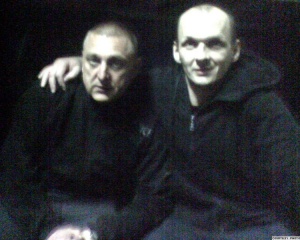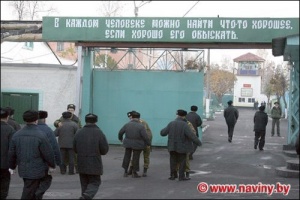Political Prisoner Cut His Abdomen Protesting against Administration Abuse

On 19 September, human rights organisation “Innovation Platform” announced that political prisoner Mikalaj Aŭtuchovič cut his abdomen in protest to the abuse suffered by the prison administration.
Shortly after that he published a letter in Narodnaja Volia newspaper where he explained why he had to employ such dangerous tactics of protest. The letter reveals the widespread violations of human rights and technical, sanitary and other norms of prison operation in Belarus.
The Belarusian corrections system remains completely unreformed since Soviet times. The judiciary tends to impose custodial sentences on offenders rather than fine them or put them on probation. As a result, Belarus occupies one of the leading positions in Europe in its per capita rate of prisoners.
Meanwhile, no effective system of social adaptation for former convicts exists in the country. Coupled with the poor conditions of life in prison, the system constitutes a truly serious social problem for modern Belarus.
The Old Enemy of the Regime
Mikalai Aŭtuchovič is now serving his second term in prison. A veteran of the Soviet war in Afghanistan, after completing his service in army he started a business in his native town of Vaŭkavysk. In 2006 he was accused of tax evasion and put to jail. Human rights activists have called his case made up, as the prosecution showed no clear evidence and held a non-transparent investigation.
It remains unclear who inspired the case against Aŭtuchovič and whether their motives were political or economic, or whether it was only the local authorities or primarily the central government that were involved.
 In 2009, authorities had to release Aŭtuchovič under pressure from western sanctions. Shortly thereafter, however, they forged another case charging him with property damage, attempted terrorism and the illegal possession of weapons. Finally, the prosecution accused Aŭtuchovič of possessing a rifle and five cartridges for which he received five years in prison.
In 2009, authorities had to release Aŭtuchovič under pressure from western sanctions. Shortly thereafter, however, they forged another case charging him with property damage, attempted terrorism and the illegal possession of weapons. Finally, the prosecution accused Aŭtuchovič of possessing a rifle and five cartridges for which he received five years in prison.
Since his sentencing Mikalaj Aŭtuchovič has become one of the most well-known Belarusian political prisoners. He actively communicated with the media trying to reveal the unlawful reality that exists in Belarusian prisons. Because of his efforts to reach out, he has experienced constant pressure from the administration which fears garnering the widespread attention of the public.
Aŭtuchovič is also well-known for his radical methods of protest to the authorities' abuse in Belarusian prisons. He has held several hunger strikes that have lasted up to three months. In 2012, he cut his veins and recently in September he cut his abdomen. Shortly after the accident he published a letter that explained his actions. The letter reveals the inhumane conditions of life in prisons and widespread violation of law hidden by prison administration.
The Reality of Belarusian Prisons
The main reason for Mikalaj cutting himself was the systematic violation of his rights throughout his imprisonment. He wrote applications to visit the doctor and a lawyer but all too often his applications disappeared and no one was informed about it. In 2013 he received notice that the prison administration considered him a persistent troublemaker, though he received no prior warning. These accusations were made in order to prevent him from early release from prison.
Both in 2012 and 2013 he received such warnings right before the slated annulment of his previous violations. Finally, Mikalaj decided that there was no other effective way to protest against these schemes by the authorities and turned to radical measures to draw attention to the problem.
Since 2005, the first year Mikalaj appeared in prison, the situation with prisoner rights has been deteriorating, according to his opinion. No state bodies outside the prisons observe what happens inside them. Prisoners know that the more they try to defend their rights, the worse they will be treated by the prison administration. Sometimes it is impossible to file a complaint as the administration do not simply let them get sent out.
Mikalaj acquired several serious illnesses, but prison doctors have never done any analysis on him and or for many other prisoners. He asked for medical help 40 times over the span of a year and in only six instances did the doctors respond, only to say they could not help him. “It is easier to file your death than to treat you”, was one of their responses. Other prisoners sometimes do not get even basic medical care. As Mikalaj said, in Hrodna prison there was no dentist for a whole year.

The daily food allowance of a prisoner does not match the norm provided by the law. Sometimes the food that is cooked is impossible to eat. At times the “purée” has been put in containers for 20 people. In another case, the prisoners detected worms in the fish and then found the boxes where the fish was preserved. The labels on the boxes said “for feeding fur-bearing animals”.
Aŭtuchovič concludes that these violations present the result of businesses that exist in Belarusian prisons and where high ranked officials are involved. Meanwhile, prisoners can receive a parcel from their relatives only once a year. Moreover, it is sometimes impossible to buy vegetables in prison store. For 20 month in Hrodna prison, Aŭtuchovič saw onions only three times.
Another major problem is tied to personal care products, which the prisoners can not possess. According to Mikalaj, in his prison 500 people had access to and used only one pair of scissors. Administrators in some prisons allow this unofficially, yet if an issue arises, they can use it as an evidence of violation of prison norms. Only in 2013 did prisoners received disposable razors and soap, and they have not received any toilet paper since 2005.
According to Aŭtuchovič, in his prison 500 people had access to and used only one pair of scissors. Read more
Aŭtuchovič also notes the poor quality of clothes and linen, as well as constant lack of basic infrastructure like electricity, heating and lamps. Often prisoners have to renovate the facilities from their own funds, which sounds like nonsense but is the sad reality they face. These kinds of situations could be brought up by many convicts, convicts who have no possibility of reporting it due to pressure from the prison administration and intimidation.
A Massive Social Problem
Although the population of prisons in Belarus has been decreasing over the last decade, it remains very high in an European context. According to the data from International Centre for Prison Studies, Belarus stands at third place among European and former USSR countries, coming in after Russia and Azerbaijan with 335 convicts per 100,000 citizens. The Belarusian judiciary still tends to impose custodial sentences instead of fines or probation.
The cases Mikalaj Aŭtuchovič described demonstrate the general state of the correction system in Belarus. It has hardly seen any reforms after those carried out during Soviet times and remains an institution that is very much closed to the public. Both its physical premises and methods of managing the system, including the prevention of recidivism, rehabilitation and programs for social adaptation for former convicts remain very poor.
The government continues to neglect the problem and tries to avoid discussions about it. Yet society too has by and large not changed their attitude towards convicts and sees them as criminals that deserve punishment rather than human beings who made a mistake and have the right to fair treatment and rehabilitation.
Only a few NGOs have tried to shed light on the problem and put it on the public's agenda, though without any success. A great deal of effort from both the government and society is needed to overcome this sad legacy, and so far no one is showing the will to do so.




